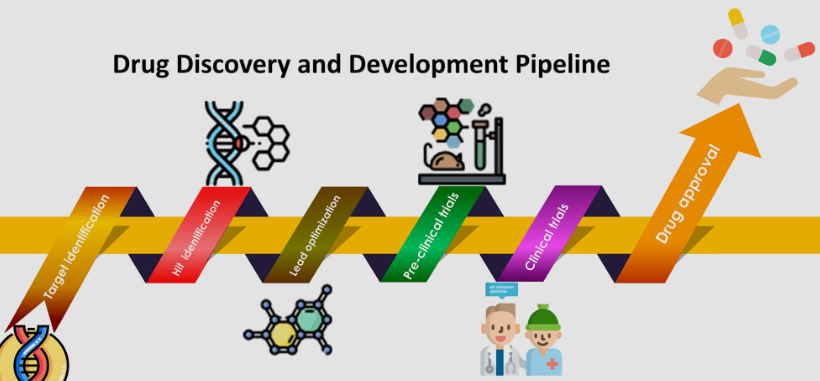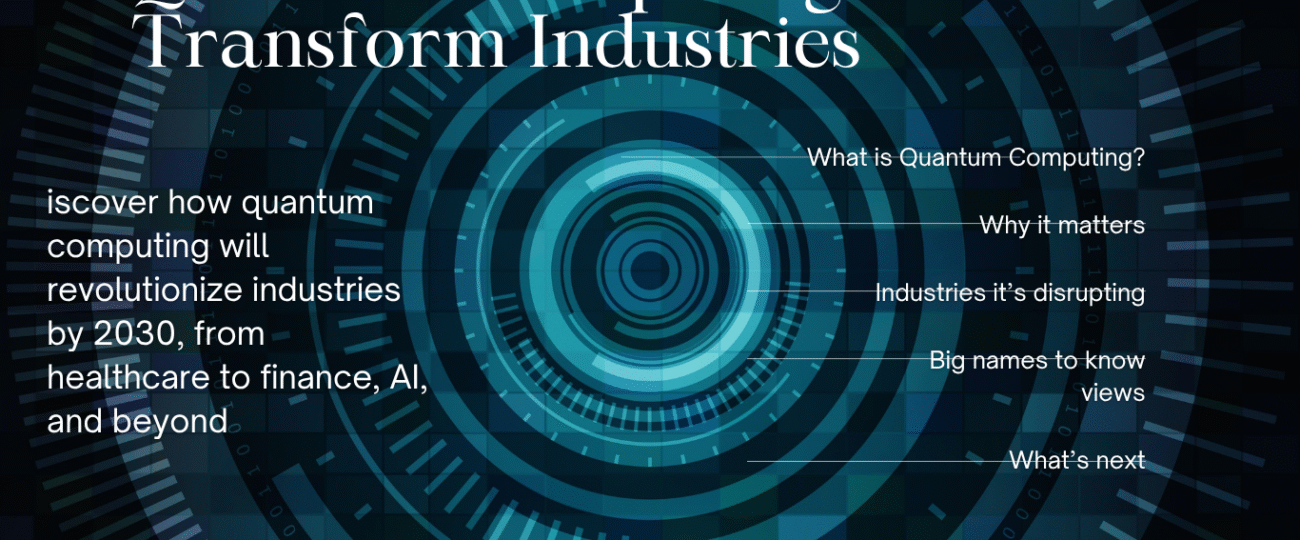Introduction: Welcome to the Quantum Era
Let’s take a second to appreciate how wild tech has gotten. I mean, we’ve gone from floppy disks and dial-up internet to AI writing emails, self-driving cars, and now—quantum computing. Sounds like something out of “Star Trek,” right? But it’s real, and it’s shaping up to be one of the biggest technological leaps of our time.
So what’s the big deal with quantum computing? Well, imagine solving problems in seconds that would take today’s fastest supercomputers years—or never—to figure out. That’s not hype. That’s the power of quantum computing. By the time 2030 rolls around, we might be looking at a world where entire industries are running smarter, faster, and more efficiently, thanks to machines that harness the weirdest rules of quantum physics.
In this piece, we’ll explore what quantum computing is (without getting lost in physics gobbledygook), why it’s such a game-changer, and how it’s going to upend everything from medicine to finance. Buckle up—this one’s gonna get interesting.
What the Heck Is Quantum Computing, Anyway?
Alright, let’s break it down. Traditional computers, like the one you’re probably using right now, run on bits. Each bit is either a 0 or a 1. That’s the basic building block. Every photo, email, app—everything—is just millions of those bits working together.
Quantum computers, on the other hand, use qubits (short for quantum bits). A qubit isn’t just a 0 or a 1. Thanks to a property called superposition, it can be both at the same time. Think of it like a coin spinning in the air—it’s not heads or tails until it lands, but during the spin, it’s sort of both.
There’s also entanglement, where two qubits become linked. Change one, and the other reacts instantly—even if they’re far apart. It’s like some sci-fi twin telepathy, and it allows quantum computers to process information in ways classical computers simply can’t.
Analogy time: If a regular computer tries keys on a lock one by one, a quantum computer tries all the keys at once. See the difference?
Why It Matters: Quantum Advantage
The buzzword in this space is quantum advantage. That’s when a quantum computer does something no classical computer could do in a reasonable timeframe. We’re not fully there yet across the board, but scientists are already seeing glimpses of it.
So why should we care? Here’s why:
- Solving wickedly complex problems: Quantum computers don’t get bogged down like traditional machines.
- Revolutionizing medicine: They can simulate molecules to discover new drugs or treatments.
- Supercharging AI: They can handle massive datasets and optimize machine learning models faster.
- Strengthening (or breaking) cybersecurity: They can decode current encryption—but also build uncrackable systems.
- Nailing optimization: They can figure out the most efficient way to do just about anything—routing, scheduling, logistics.
1. Quantum Computing in Healthcare and Pharma: Faster Cures, Personalized Treatment
Healthcare is already benefiting from AI, but quantum computing is going to blow the doors off.
Why it matters: Creating a new drug takes years and billions of dollars. A big reason? Testing molecular interactions takes forever. Quantum computers can simulate how a drug molecule might behave inside the human body—without needing actual humans.
Real-life case: Pharma giant Roche is teaming up with Cambridge Quantum to accelerate drug discovery using quantum computing. That’s not some pipe dream; it’s already happening.

Imagine this:
- Getting a cancer treatment tailored to your specific DNA
- Developing vaccines for new viruses within weeks, not years
- Predicting disease outbreaks using advanced simulations
Bottom line? Quantum computing might help doctors shift from reactive to proactive care.
2. Quantum Computing in Finance: Smarter Trading, Lower Risk
Money never sleeps—and neither will quantum-enhanced finance models.
Financial institutions rely heavily on algorithms to forecast trends, allocate assets, detect fraud—you name it. But they’re still limited by classical computers’ processing power.
Quantum fix:
- Risk modeling gets faster and more accurate
- Fraud detection becomes more proactive
- Portfolio optimization hits new heights
Use case: JPMorgan Chase has been experimenting with quantum algorithms to improve portfolio management. Traditional models take hours. Quantum models do it in minutes.
Fun fact: Financial markets involve millions of variables—human behavior, political shifts, weather events (yep, even that). Quantum computing can process all those messy factors like it’s no big deal.
3. Quantum Computing in Cybersecurity: Both Threat and Savior
Here’s where things get dicey.
Quantum computers could theoretically break the encryption that keeps our emails, bank accounts, and data safe. Why? Because they’re so good at solving math problems—especially the kind that encryption relies on.
But, we’re not defenseless. There’s a race on to develop quantum-resistant encryption—new methods that even a quantum computer couldn’t crack.
What’s happening now:
- NIST (National Institute of Standards and Technology) is leading a global competition to create quantum-safe encryption.
- Companies like IBM and Google are already integrating quantum security protocols into cloud services.
So yeah, it’s a threat. But the good guys are moving fast.
4. Logistics and Transportation: Welcome to Ultra-Efficiency
Every time you get a same-day delivery, there’s a tiny miracle happening behind the scenes—algorithms figuring out the best delivery routes, warehouse logistics, and driver schedules. Quantum computing is about to make that miracle a whole lot smarter.
Think about this:
- Airlines planning flight routes
- Retailers managing global supply chains
- Cities optimizing public transportation
Case Study: Volkswagen ran a pilot project using a quantum algorithm to reduce traffic congestion in Lisbon. Result? More efficient bus routes and less gridlock.
Future potential:
- Real-time route planning based on traffic, weather, and demand
- Supercharged warehouse automation
- Reduced carbon emissions from smarter logistics
5. Artificial Intelligence: Quantum’s Secret Weapon
AI is having its moment—but it’s still running on classical computing limits. Imagine feeding AI models exponentially more data, training them faster, and giving them the ability to learn patterns we haven’t even thought of yet.
Quantum boosts AI by:
- Accelerating training time for machine learning models
- Improving decision-making with better data processing
- Making AI more adaptive and dynamic
Example: Google is exploring how quantum computing can help optimize neural networks (the building blocks of AI). This could lead to breakthroughs in natural language processing, robotics, and computer vision.
So yeah, when AI and quantum computing team up—it’s next-level.
Who’s Leading the Charge?
Let’s name names. Here are the major players making quantum computing a reality:
- IBM: They’ve got the IBM Quantum Network and made quantum systems accessible via the cloud.
- Google: Achieved “quantum supremacy” with their Sycamore processor in 2019.
- Microsoft: Pushing forward with Azure Quantum and topological qubit research.
- D-Wave: Focused on quantum annealing for solving optimization problems.
- IonQ & Rigetti: Startups developing next-gen quantum hardware and making waves.
Interesting trend: Big Tech isn’t alone. Governments, universities, and even startups with just a few dozen employees are making breakthroughs.
But Let’s Be Real—There Are Big Challenges
As exciting as this all sounds, quantum computing still has a ton of hurdles:
- Qubit stability (a.k.a. decoherence): Qubits are sensitive little things. Even slight changes in temperature or vibration can mess them up.
- Error correction: Quantum systems are noisy, and correcting errors is incredibly hard.
- Scaling: Right now, quantum machines have a relatively small number of qubits. To unlock true power, we need thousands—or millions.
- Lack of software tools: Programming for quantum is a whole different game.
In short: We’re still in the early innings. But progress is steady.
What’s Coming by 2030?
Alright, so what can we realistically expect in the next five years?
Here’s the projected roadmap:
- 2025–2027: Quantum advantage in narrow fields like chemistry and optimization
- 2028: Increased adoption in enterprise applications (cloud-based quantum-as-a-service)
- 2030: Widespread use in logistics, finance, healthcare, and AI workflows
You probably won’t have a quantum laptop on your desk—but companies you rely on (Amazon, Google, your bank) will definitely be using them behind the scenes.
How You Can Get Ahead (Even If You’re Not a Scientist)
You don’t need a PhD to start understanding quantum. If you’re in tech, business, or even just curious, here’s how to stay ahead:
- Follow industry blogs and newsletters (Quantum Insider is a good one)
- Play with quantum simulators like IBM’s Qiskit (they’re free!)
- Watch for how your industry is evolving—especially if you’re in finance, logistics, or healthcare
- Consider taking a beginner course (many are online and bite-sized)
The earlier you start paying attention, the more prepared you’ll be.
Final Thoughts: This Isn’t Sci-Fi Anymore
Quantum computing is like the internet in the early ’90s. Back then, people were skeptical. Now? You literally can’t live without it.
We’re standing at a similar turning point. The companies, governments, and individuals who embrace quantum early will shape the next decade. Whether you’re a coder, a strategist, or just a curious mind, now’s the time to learn and explore.
2030 might feel far away—but in the world of tech, it’s practically tomorrow. stay updated with rousertechnews.com


Yesterday, while I was at work, my cousin stole my iphone and tested to see if it
can survive a 25 foot drop, just so she can be a youtube sensation.
My apple ipad is now destroyed and she has 83 views. I know this
is completely off topic but I had to share it with someone!
You actually make it seem so easy together with your
presentation however I in finding this matter to be actually something that I believe I would by no means understand.
It kind of feels too complex and extremely broad for me.
I am taking a look forward to your subsequent post, I’ll attempt to get the dangle of it!